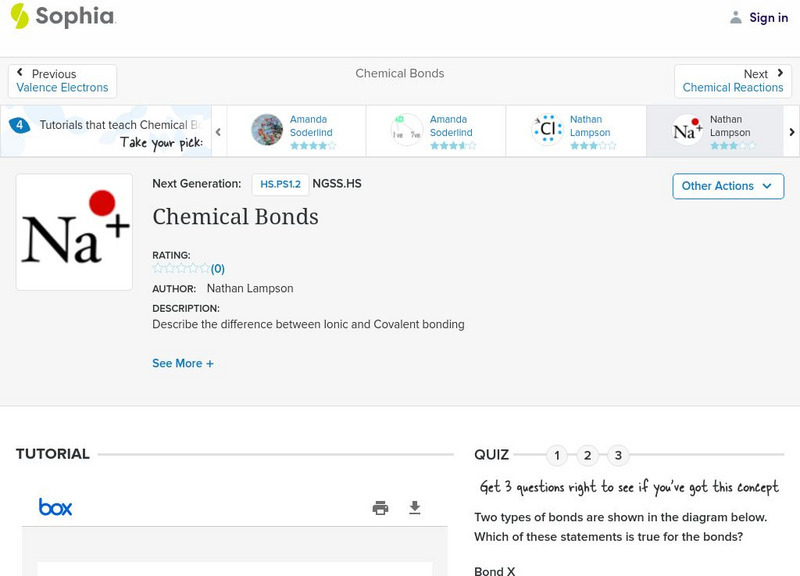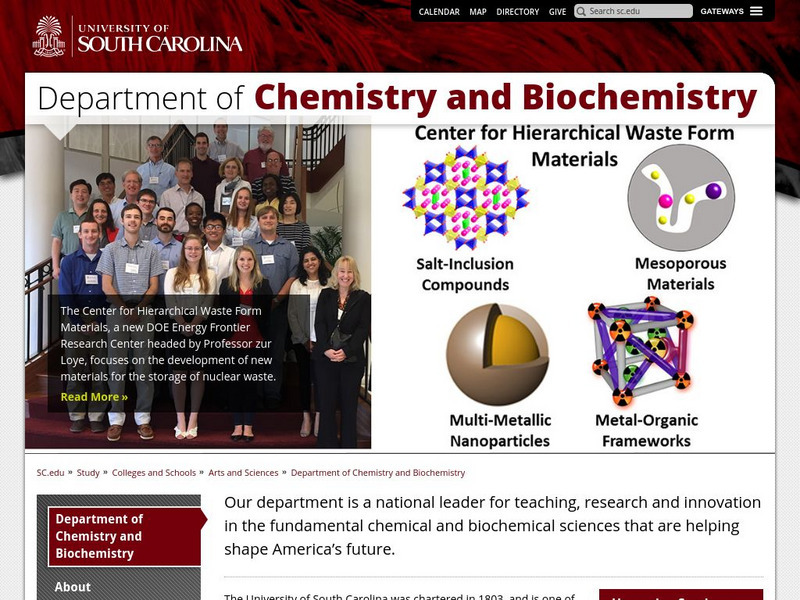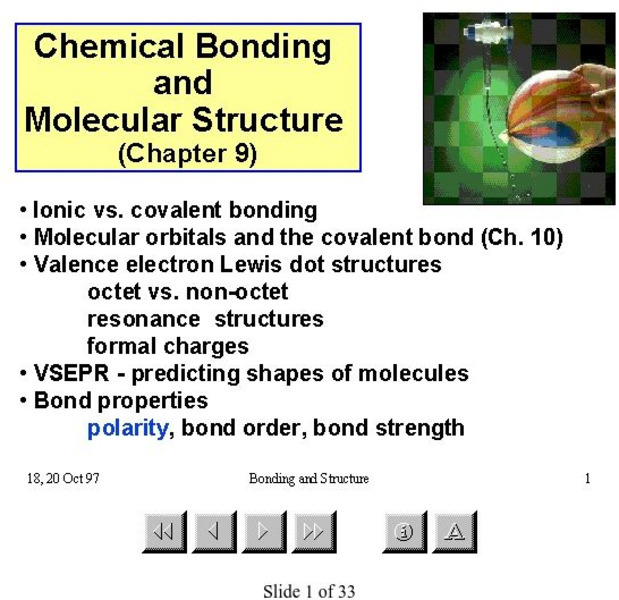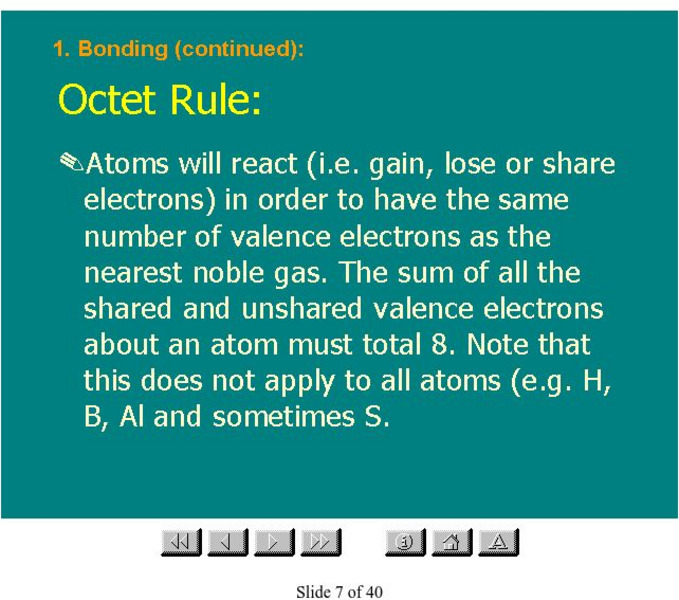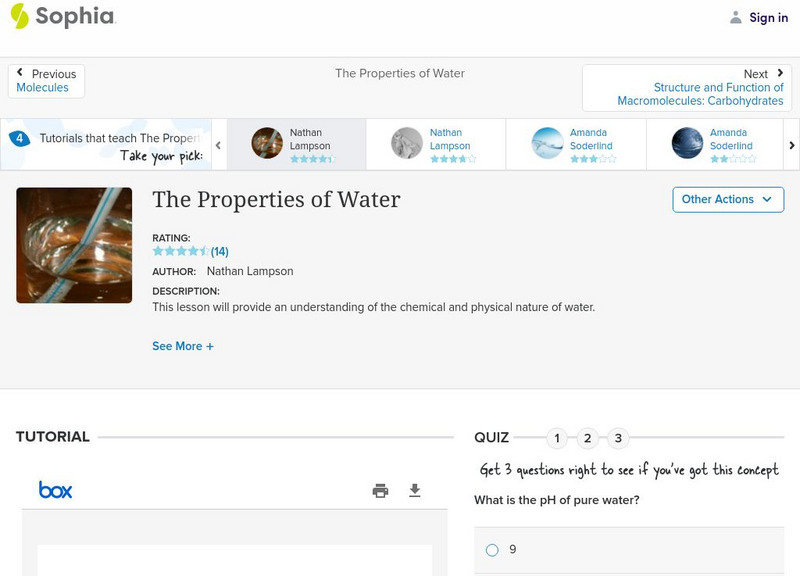Sophia Learning
Sophia: Characteristics of Chemical Bonds: Lesson 4
This lesson will present the basic properties and characteristics of chemical bonds. It is 4 of 4 in the series titled "Characteristics of Chemical Bonds."
Sophia Learning
Sophia: Chemical Bonds: Lesson 5
Describe the difference between Ionic and Covalent bonding. This lesson is 5 of 5 in the series titled "Chemical Bonds."
Other
Chemical Bonds: Formal Charges
A slide presentation with several slides dedicated to the topic of formal charges. Formal charges are explained, and examples are given. A practice example is provided.
American Chemical Society
Middle School Chemistry: Temperature and Rate of a Chemical Reaction
Watch molecules collide with enough energy that bonds break and form new bonds in a chemical reaction.
Other
Chemical Bonds: Writing Lewis Structures
This slide show explains the rules for writing Lewis structures and then demonstrates an example. It then provides a practice example for the student to try.
McMaster University
Mc Master University: Chemistry: Ionic Bonds
This site gives a brief description of bonding in ionic compounds.
Other
Chemical Bonds: Electronegativity
A slideshow with several slides dedicated to electronegativity, the trend which is illustrated in the slide at this link. Others slides explain how the electronegativity can be used to determine bond character.
McMaster University
Mc Master University: Molecular Structure
This PowerPoint presentation features 33 slides that explain chemical bonding and molecular shape.
Curated OER
Simon Fraser University: All About Chemical Bonds
G.N. Lewis (1875-1946), chemist whose work included devising the theory of chemical bonding
Sophia Learning
Sophia: Chemical Reactions: Lesson 6
This lesson will present a basic understanding of the periodic chart of elements and how to predict chemical reactions based on given information. It is 6 of 9 in the series titled "Chemical Reactions."
Sophia Learning
Sophia: Chemical Reactions: Lesson 9
This lesson will present a basic understanding of the periodic chart of elements and how to predict chemical reactions based on given information. It is 9 of 9 in the series titled "Chemical Reactions."
Other
Organic Chemistry: Lewis/kekule Structures
This slide presentation contains a few slides that will be useful for students learning to write Lewis structures. A discussion of multiple bonds is included, and clear examples are shown.
American Chemical Society
Middle School Chemistry: Temperature Changes in Dissolving
See how temperature changes affect dissolving and the molecular bonds in a water molecule.
Curated OER
Simon Fraser University: All About Chemical Bonds
Irving Langmuir (1881-1967), chemist who won the Nobel Prize in 1932 for work on the chemistry of surfaces and monomolecular layers, and worked on the theory of electron pair bonding following N.G. Lewis.
Other
University of South Carolina: Resonance in Lewis Structures
A slide show with several slides dedicated to the topic of resonance in Lewis structures. Diagrams help illustate the examples. A practice example is provided.
Other
Beautiful Chemistry: Beautiful Structures: Metal Organic Frameworks
Interact with these virtual structures of metal-organic frameworks. These special kinds of crystals are made of organic molecules and metal-containing units, which are linked together by chemical bonds.
American Chemical Society
Middle School Chemistry: Why Does Water Dissolve Sugar?
Explore this animation to learn why water dissolves sugar.
Other
Organic Chemistry: Octet Rule
This slide presentation contains a description of the octet rule, as well as many related topics.
Sophia Learning
Sophia: The Properties of Water: Lesson 3
This lesson will provide an understanding of the chemical and physical nature of water. It is 3 of 4 in the series titled "The Properties of Water."
Sophia Learning
Sophia: The Properties of Water: Lesson 4
This lesson will provide an understanding of the chemical and physical nature of water. It is 4 of 4 in the series titled "The Properties of Water."
American Chemical Society
Middle School Chemistry: Why Does Water Dissolve Salt?
Explore this animation to learn why water dissolves salt.
Other popular searches
- Chemical Bonding Lesson Plan
- Chemical Bonding Crossword
- Chemical Bonding Activity
- Edible Lab Chemical Bonding
- Chemistry Chemical Bonding
- Chemical Bonding Ionic
- Chemical Bonding Inquiry
- Worksheets Chemical Bonding
- Chemical Bonding Case Study
- Chemistry Chemical Bonding
- Matter and Chemical Bonding
- Science Chemical Bonding

